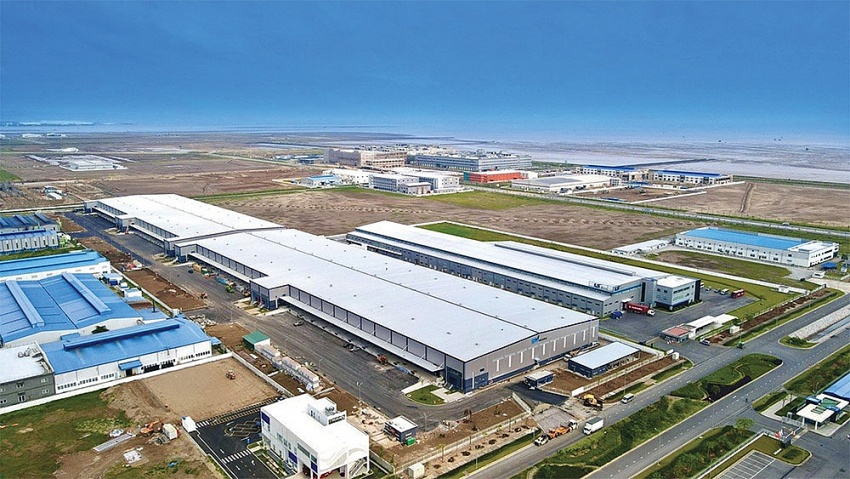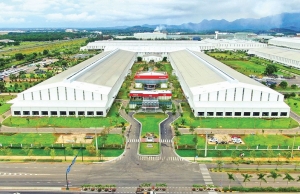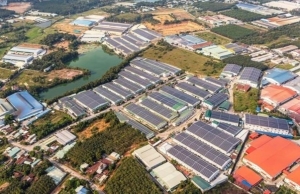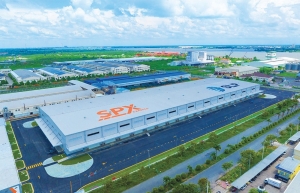Green credentials garner a boost for industrial property
Julien Nha Vinh Nguyen, country head of Thai logistics and industrial zone (IZ) developer WHA Vietnam, told VIR last week that the company’s sustainability development priorities were incorporated into its business strategy, in line with the UN’s Sustainable Development Goals and its net-zero target by 2050.
 |
| Smart industrial zone concepts are based on international-standard quality design and infrastructure, photo Le Toan |
“In particular, WHA IZs differentiate with the WHA Smart Eco IZ concept based on the international standard quality of design and infrastructure, reliability of utilities, and environmental care, integrating use of Industry 4.0 technologies,” Nguyen said.
Some examples of WHA Smart Eco IZ features in the central province of Nghe An include a unique biological system for its central wastewater treatment facility that does not use chemicals and is environmentally friendly; a centralised control room that can track real time and control environmental parameters such as air and wastewater quality; and energy efficiency measures by use of renewable energy sources such as solar power and LED lighting.
For social criteria, Nghe An WHA IZ has to date attracted over $1.2 billion of foreign investment from high-value industries, including some of the largest electronics manufacturers in the world. It results in significant job creation and higher income levels with skills development.
“Our efforts extend to actively supporting community development through charitable activities and infrastructure projects such as building schools and roads. Furthermore, we provide scholarships to students in schools and universities, ensuring access to quality education,” Nguyen said.
For example, WHA designs flood protection system after exhaustive analysis of historical hydrological data to prevent flood risks to WHA IZ Nghe An as well as nearby villages.
Meanwhile, Truong Khac Nguyen Minh, deputy general director of KCN Vietnam, another IZ developer in Vietnam, said one of the biggest challenges in environmental factors that many industrial developers face is infrastructure, such as outdated waste treatment system.
“Thus, if we want to form eco-industrial areas, industrial real estate investors have to build from the beginning as it is not easy to convert existing parks into eco-industrial ones,” Minh said.
For secondary industrial real estate developers, KCN Vietnam hopes that they can be supported in infrastructure investment costs from government and local authorities, and thereby be able to offer more incentives to investors and business owners.
KCN so far has nine industrial property development projects located in Bac Giang, Bac Ninh, Hai Duong, Haiphong, Dong Nai, and Long An provinces, with total capital of around $300 million.
Sustainability initiatives are becoming increasingly important in Southeast Asia, driven by both tenant demand and government policies.
According to a report on navigating Southeast Asia’s economic growth released last week by Cushman & Wakefield, factors such as green building certification, quality, and sustainability considerations are becoming key decision factors for businesses looking to expand their presence in the region.
“One of the heads of a prominent tech company shared that sustainability is a business imperative, and many companies have made commitments in this regard. But beyond that, occupiers are looking at an entire ecosystem and how well the workplace can enable and enhance employee experience,” said Wong Huey Feng, head of Integrated Portfolio Management at Cushman & Wakefield Southeast Asia.
 | More investment expected within industrial property Industrial property has been one of the hottest segments for mergers and acquisitions over the last two years. Bich Ngoc spoke with Marco Forster, head of ASEAN Advisory at Dezan Shira & Associates, on his assessment of the sector. |
 | Industrial property to heat up as it takes on neighbours Although it was the segment achieving the best growth in property in 2023, industrial real estate is forecast to face many uphill battles in 2024. |
 | Industrial real estate market thriving on FDI flow: insiders Despite formidable challenges for the real estate market in 2023, industrial property market has stood out as a bright spot that has maintained its growth momentum on the back of the foreign direct investment (FDI) flow, according to insiders. |
 | Reforms essential for industrial M&As The industrial property market in 2024 in terms of mergers and acquisitions faces optimism this year, with new rules likely to boost progress. |
What the stars mean:
★ Poor ★ ★ Promising ★★★ Good ★★★★ Very good ★★★★★ Exceptional
Related Contents
Latest News
More News
- Saigon Centre gains LEED platinum and gold certifications (February 12, 2026 | 16:37)
- Construction firms poised for growth on public investment and capital market support (February 11, 2026 | 11:38)
- Mitsubishi acquires Thuan An 1 residential development from PDR (February 09, 2026 | 08:00)
- Frasers Property and GELEX Infrastructure propose new joint venture (February 07, 2026 | 15:00)
- Sun Group led consortium selected as investor for new urban area (February 06, 2026 | 15:20)
- Vietnam breaks into Top 10 countries and regions for LEED outside the US (February 05, 2026 | 17:56)
- Fairmont opens first Vietnam property in Hanoi (February 04, 2026 | 16:09)
- Real estate investment trusts pivotal for long-term success (February 02, 2026 | 11:09)
- Dong Nai experiences shifting expectations and new industrial cycle (January 28, 2026 | 09:00)
- An Phat 5 Industrial Park targets ESG-driven investors in Hai Phong (January 26, 2026 | 08:30)

 Tag:
Tag:





















 Mobile Version
Mobile Version